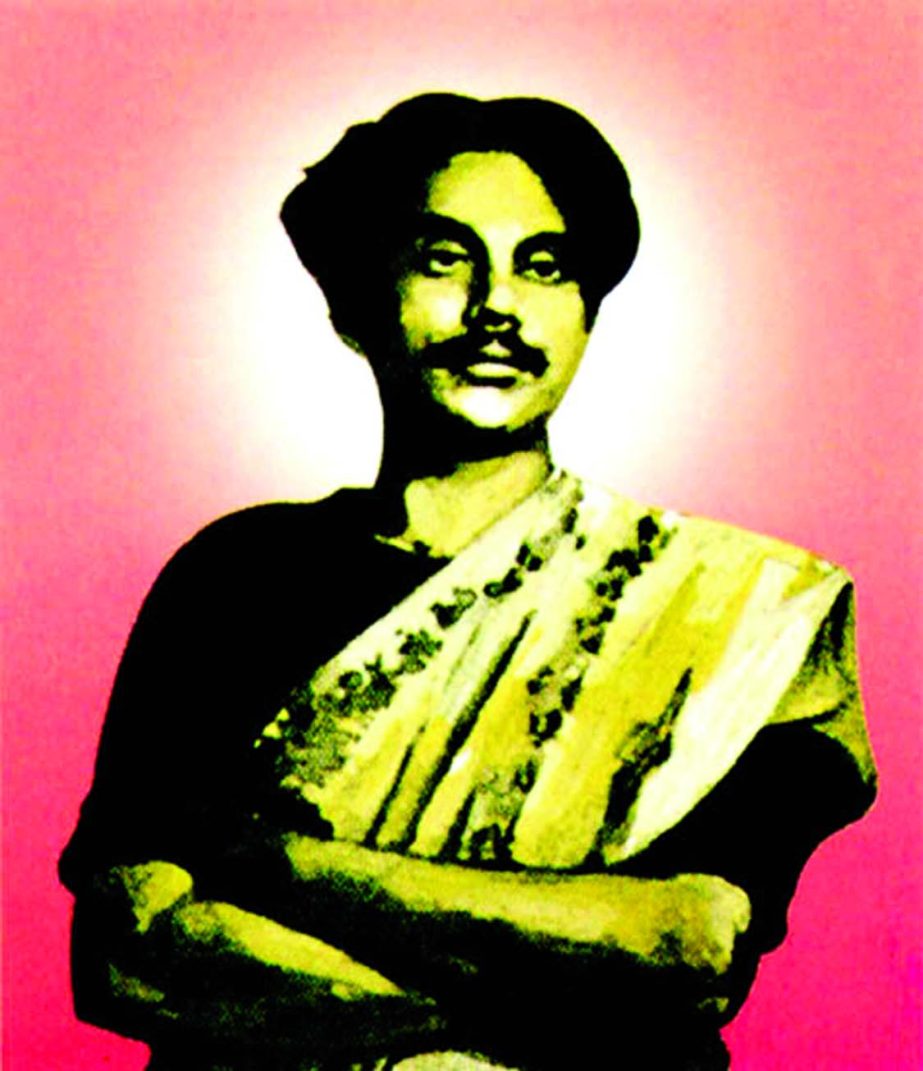
Dr Md Shakhawat Ullah Chowdhury :
When we think of Poet Kazi Nazrul Islam , the image of revolutionary moorings lurks in our mind. Born and brought up in the midst of crushing poverty afflicting him appallingly the ‘Rebel Poet’ could well surmise the predicaments of the downtrodden masses of peasants and other proletariat. His composition full of fiery rendition was a symbol of protest against exploitative social order favouring the upper class and carrying coals to a new castle.
He wrote number of poems all with profound understanding about the face of poverty. Poverty in fact was a motivating factor in making such a revolutionary Poet like Kazi Nazrul Islam. Well we can allude to the touchy composition of poem ‘Daridrya’ like:
Hey daridrya tumi more korechho mohan,
Tumi more daniyacho Christer somman
O poverty, thou hast made me great
Thou hast made me honoured like Christ
With his crown of thorns.
Thou hast given me
Courage to reveal all. To thee I owe
My insolent, naked eyes and
sharp tongue.
Thy curse has turned my violin
to a sword…
O proud saint, thy terrible fire
Has rendered my heaven barren.
O my child, my darling one
I could not give thee even a drop of milk
No right have I to rejoice.
Poverty weeps within my doors forever
As my spouse and my child.
Who will play the flute?
Daridry (Poverty)
– Translated by Kabir Chowdhury
He was religious. He hated fanaticism. His works led Islamic devotional songs into the mainstream of Bengali folk music exploring the Islamic Faith Kalima and practices Namaz (prayer), Roza (fasting), Hajj (pilgrimage), and Zakat (compulsory charity). He wrote the song O Mon Ramzaner Oi Rozar Sheshe Elo Khushir Eid on fasting and Eid.
This was regarded by his contemporaries as a significant achievement, as Bengali Muslims had been strongly averse to devotional music. Nazrul’s creativity diversified as he explored Hindu devotional music by composing Shyama Sangeet, Bhajans, and Kirtans. Sometimes he merged Islamic and Hindu values. Nazrul wrote over 500 Hindu devotional songs. Nazrul’s poetry and songs explored the philosophy of Islam and Hinduism.
Nazrul’s poetry imbibed the passion and creativity of Shakti, which is identified as the Brahma, the personification of primordial energy. He wrote and composed many Bhajans, Shyamasangeet, Agamanis, and Kirtans. He also composed many songs of invocation to Lord Shiva and the goddesses Lakshmi and Saraswati and on the love of Radha and Krishna.
In another article entitled Hindu Mussalman, published in Ganabani on 2 September 1922, he wrote:
“No prophet has said, “I have come for Hindus. I have come for Muslims. I have come for Christians.” They have said, “I have come for the humanity for everyone, like light.” But the devotees of Krishna says, “Krishna is for Hindus.” The followers of Muhammad says, “Muhammad is for the Muslims.” The disciple of Christ (say Christ) is for Christians. “Krishna-Muhammad-Christ has become national property. This property is the root of all trouble. Men do not quarrel for light but they quarrel over cattle.”
Nazrul assailed fanaticism in religion, denouncing it as evil and inherently irreligious. He devoted many works to expound upon the principle of human equality, exploring the Qur’an and the life of Muhammad (Sm). Nazrul has been compared to William Butler Yeats for being the first Muslim poet to create imagery and symbolism of Muslim historical figures. His condemnation of extremism and mistreatment of women provoked condemnation from Muslim and Hindu fundamentalists.
In 1920, Nazrul expressed his vision of religious harmony in an editorial in Joog Bani,
“Come brother Hindu! Come Musalman! Come Buddhist! Come Christian! Let us transcend all barriers, let us forsake forever all smallness, all lies, all selfishness and let us call brothers as brothers. We shall quarrel no more.”
Religious in mind and in belief he raised his voice against derailed traditional community neglecting the hopelessly helpless people who need food and shelter. He thundered : Masjide as sinni asilo adhel gust o ruti. He dreamt of a just and egalitarian society.
Nazrul never compromised with the colonial masters thiking of ousting the alien ruler and its cohorts from the holy motherland. He was put to jail several times for raising voice against colonialism and subjugation and triggering anti-colonial movement and sedition. The famous song like ‘Karar oi louho kopat’ called for breaking all chains of foreign domination.
We may refer another poem Shikol pora chhol
Some lines are quoted here:
Ei shikol-pora chhol, moder ei shikol-pora chhol.
Ei shikol porei shikol toder korbo re bikol!

These songs continue to be a great source of inspiration for the masses fighting for emancipation from colonial thralldom.
It inspired our freedom fighters during our War of Liberation.
Nazrul was an exponent of humanism. In fact he was a symbolic of human values. This is echoed deep in his poems and personal life reflecting the humanitarian values.
(The writers are of the department of Public Administration, University of Chittagong and Assistant Professor, Southern University respectively)

